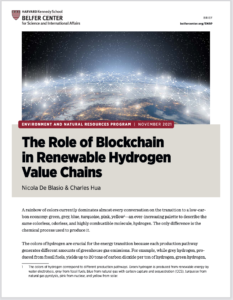Full Title: The Role of Blockchain in Green Hydrogen Value Chains
Author(s): Nicola De Blasio, Charles Hua
Publisher(s): Belfer Center for Science and International Affairs at the Harvard Kennedy School
Publication Date: November 15, 2021
Full Text: Download Resource
Description (excerpt):
A rainbow of colors currently dominates almost every conversation on the transition to a low-carbon economy: green, grey, blue, turquoise, pink, yellow – an ever-increasing palette to describe the same colorless, odorless, and highly combustible molecule, hydrogen. The only difference is the chemical process used to produce it.
The colors of hydrogen are crucial for the energy transition because each production pathway generates different amounts of greenhouse gas emissions. For example, while grey hydrogen, produced from fossil fuels, yields up to 20 tons of carbon dioxide per ton of hydrogen, green hydrogen, produced from renewable energy sources like solar and wind, yields no emissions. Furthermore, although these colors all refer to the same molecule, production costs differ: green hydrogen remains substantially more costly today.
With aggressive development and deployment of electrolyzers and other hydrogen technologies at scale, green hydrogen could become cost-competitive with blue hydrogen, produced from natural gas with carbon capture, by 2030 in many countries. Overall, the rate at which green hydrogen costs decrease will also depend on government policies and incentives, such as carbon pricing and tax credits.
Therein lies a critical challenge for the successful transition to a low-carbon economy. As energy systems increasingly evolve from centralized to decentralized, from “grey” to “green,” stakeholders will need to efficiently account for and track emissions and green molecules in a transparent, secure, and standardized way, and must be able to do so along value chains from production to consumption.
